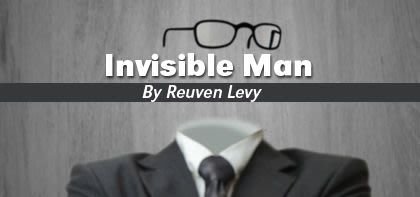
Invisible Man
He grew up without a mind of his own. Although he felt no love from his parents, he was conditioned to believe that he must act and think like them...

At the age of 4 or 5, I realized that my parents didn’t love me. At least, that’s how it seemed to me. It would be more accurate to describe it as a feeling that they didn’t care about me, they didn’t care about my needs, what I wanted didn’t matter to them. I think that was the day that my relationship with my parents ‘broke’ and it hasn’t been fixed to this day.
I have Torah and clarity now, to understand that what happened on that day was deliberately designed by G-d to break the relationship – in order that I would then have the task – and the merit – of working to try to fix it.
But that doesn’t mean that it wasn’t very hard as a 4 year old to be dressed as the ‘Invisible Man’ – wrapped in toilet paper from head to toe, for the Purim party. To suddenly realize, perhaps after looking in the mirror, that I really, really didn’t want to go to the party dressed in toilet paper, and for my parents to completely ignore my cries and pleas not to go. I think it ended with me ripping the paper off in a mad frenzy, but that part is a blur. I was broken and lost.
Around that time (it could have been before or after) I was on holiday in Spain with my parents and got separated from them whilst looking for a non-kosher restaurant to eat in. I recall trying to look in one restaurant and realizing that they weren’t there, and I was lost, and then the rest is a complete blank, until I somehow ended up at the British Embassy, until my Mum came to get me, who knows how long after.
I recall being relieved to see my Mum, but strangely just as happy to be held by some Embassy staff lady, who cuddled me and gave me  orange juice to drink while we waited for my parents to be found.
orange juice to drink while we waited for my parents to be found.
It may be unfair to say, but I think I felt more ‘love’ from that lady than I did from my parents.
But otherwise, I was a generally happy kid and for the next 30-odd years had no conscious expression of my feeling that I was not loved, and perhaps did not love them either. Such an idea would be too ‘foreign’ to contemplate.
No, we had a happy family. Mum and Dad were ‘great’ parents and we were ‘great’ kids. I never fought with them, and they never got upset or angry at me. A perfect relationship – or so I thought.
The cracks started to show after I married. My wife didn’t understand my parents very well, or my relationship with them. To her, I seemed to place too much loyalty on acquiescing to my parents’ will above myself, her and our family.
I assumed that this was simply a standard mother-in-law / wife conflict and paid no real attention to it, other than trying to keep both sides happy. However, as an outsider, my wife could see what I couldn’t – or wouldn’t. I placed too much value on keeping my parents happy, to the cost of myself, my marriage and my family life.
Basically, where I could usually be relied upon to make the ‘right’ decision, I would make the wrong one, repeatedly, in this area. I would pick falsehood over truth, for the ‘higher good’ – as I then saw it – of making my parents happy.
I would excuse my behavior then, on a misrepresentation of the mitzvah of kibbud av v’em – honoring your parents. However, for many years I wasn’t religious, yet I still acted in this same manner. So that wasn’t the reason.
I now believe that the real reason was that I was scared to go against their viewpoint. My relationship with them would not – in my view – hold up to the trauma of a ‘dispute’. I needed to have parents (doesn’t everyone?), and having felt (as a 4 year old) how it was to lose them – lose their love and to lose them physically, I would put almost everything else on the line not to go through that again.
My weakness to make my own decisions meant that on a number of occasions I would agree to go with their (usually Dad’s) opinion, against my actual wishes. For example, when choosing a university degree. I was very interested by Artificial Intelligence and Hi-tech design courses. My Dad however basically scorned the idea and strongly suggested I do ‘Business Studies’ instead. It all turned out well, of course, (Baruch Hashem), but the unspoken resentment would be buried in my heart to add to a list of unspoken grievances that were never aired.
I have no doubt that my parent had no real clue what they were doing to me on any of these occasions, certainly not the magnitude of the hurt or harm these things had on me.
To be truthful, though, I do believe there must have been some twinge of consciousness that these things were not good for me, that their actions were serving them, not me. But what can I say – we are none of us perfect, and we make mistakes. So they are culpable for their behavior and they have their own cheshbon (accounting) with G-d for each and every act, thought and deed.
But G-d arranged it all, specifically and deliberately for me to learn, grow and suffer – as necessary to allow me or push me to learn and grow. So I can’t ‘blame’ them – even if I wanted to – and part of me does want to – but that is the easy way out, and avoids any need to attempt to rectify the damage.
Before damage can be fixed, however, we need to realize, appreciate and accept that damage has been done. I lived for a very long time with the self-imposed notion that ‘no damage has been done’. For so long as I persisted with that frame of reference I was not able, simply couldn’t, fix anything.
G-d has a good sense of humor. He also gives us plenty of hints for us to work out the truth – so long as we have a desire to try to find the truth. My problem began with being dressed as the ‘Invisible Man’. And I spent the next 30-something years feeling exactly that. I was the Invisible Man!
In school discos, at college, in lectures, at work – I was the Invisible Man. I wasn’t sure if I was really there some of the time, or if it was all a figment of my imagination. I saw everyone, but believed that pretty much no-one ever saw me. I assumed that I ‘blended’ into the background, and no-one cared if I was there or not.
At one school disco, on one occasion, a Mum came over to me to see if I was ‘alright’. Obviously, I must have had a despairing look on my face. I was shocked at the time to realize that someone could actually see me!
Remarkably, perhaps, I had good friends, at almost all ages, and enjoyed seeing them and going out. So life largely appeared perfectly fine and ‘on track’.
Fast forward to 21st October 2011. Dad dies. The news is broken gently to me by the phone calls in the middle of the night and the man at the door. I wasn’t told explicitly, but I knew in my heart he had died. The confirmation after Shabbat did not come as a surprise.
I sat down and cried when I heard. I don’t recall my exact feelings at that time, but I think my tears were based on ‘poor Abba’ that he had to die, rather than on any loss I felt personally.
At the funeral, I cried a lot, although this time definitely for him. That he be safe and happy in Shemayim, that he shouldn’t worry, that everything will turn out good for him. I told him repeatedly that he should find Rav Nachman: “Run to him, Abba! He will help you, Abba, he will help you!
But when all was said and done, I didn’t miss my father. I still don’t.
I do think, however, that I will do so in the future, when I finally resolve this mess, which seems much closer today than ever before.
But for now, I don’t have the memories to miss – I simply have a big, black hole where my ‘relationship with Dad’ should be.
If I think back to my memories of ‘me and Dad’ I can find a couple of occasions in my childhood when I felt close to my Dad. One was when I played football in the backyard with him for perhaps 5 minutes, before he got too tired. I only remember one such occasion.
Another one was when he would set me simple math problems to solve and would give me one of his fruit pastilles as a prize for getting them right.
Trawling through the years in my mind however does not locate any other gleaming highlights, not the ones I am searching for, the ones of a ‘loving father’.
Two things finally disabused me of my hither-to-fore notion that this relationship was ‘normal’, or ‘acceptable’.
The first was my wife’s self-imposed shiva (mourning).
In England, Liverpool, we had a ‘shiva’ period and it was, relatively speaking, quite ‘frum’. We covered up the mirrors and didn’t leave the house. No TV or radio, and we sat on the low chairs. What we didn’t do, though, was speak about Dad.
This was largely for two reasons:
Firstly, the visitors the shiva were not aware of the ritual enough to know that they are not meant to speak, but to let the mourners speak about the deceased. And secondly, and perhaps more crucially, we had nothing to say anyway.
We had some amusing anecdotes about Dad’s unique behavior and approach to life, but like me, I think my sisters had little to share too, in the way of ‘Dad and me’ memories.
From my perspective, their childhood was a lot like mine. Mum is harder to figure out, although it is equally possible that their otherwise perfect marriage actually lacked the same central ‘connection’ that was missing in my relationship, too.
When my wife questioned me on the ‘shiva’ in Liverpool, she insisted that we do it anyway, back home in Israel. When the kids had gone to school and we were alone in the house, I would sit and talk about Dad for as long as necessary to ‘get it out’.
So I did. And that’s when I first revealed to myself what I really knew all along. I had no ‘relationship’ with my Dad. I didn’t feel loved by him and in truth felt that he really didn’t care for me.
I trawled my memories trying to find evidence against this conclusion, to find instances where he clearly showed me his love, attention, caring. Apart from those mentioned, I couldn’t locate those memories I wished I had.
I saw that this dynamic played out also in his relationships with my sisters, with friends (he had none) and perhaps, too, even with Mum. Oy, what a waste of life.
And then it hit me. Full in the face, like a Juggernaut: I am Dad.
I (more or less) have the same selfish relationship with my kids and with my wife.
Now I really cried.
For several days, I felt gob-smacked, dumbstruck, like someone had scooped out all of my insides and left just a gaping black hole. I functioned normally, but could not look my wife or kids in the eye.
I am a self-centered, selfish, individual. I lack a fundamental connection to you, I don’t even know if I love you, and what’s worse, I have no idea of how to love you, how I can have a true connection with you and if I can ever change enough to do so…
Whilst struggling with this new-found insight and revealed major problem, my friend Benny’s Dad died. I wasn’t so close to Benny, but in an attempt to start making more effort to connect to people, I decided to go to the funeral and the shiva.
Some things were very similar to Dad’s funeral – the basic ceremony of putting the body in the ground.
Some things were very different. There were many lengthy hespedim (eulogies) given by his friends, neighbours, work colleagues and family members. Each spoke of the deceased’s good deeds, and in particular his connection and commitment to his children.
Benny spoke about how he was encouraged by his father to pursue his dreams, and how he felt that his father loved him the most out of all of his siblings – until he spoke to his siblings and found out that each of them also thought their father loved them the most.
I realized again then that my experience with my father, was not normal or inevitable, that it was perfectly possible to have a genuine, loving relationship with a parent.
But the problem still remained – how to do this?
I had some ideas, practically, to speak more with my kids to show interest in their day, to read stories to them at night.
But the major problem remained. I knew myself that this would be short-lived. That I would effectively be putting on a charade, without the underlying feeling. How could I get to that? If I didn’t have it, I couldn’t give it. I can’t create something I don’t have…?
Staring into the bottomless pit, there is only one option left. G-d.
For Him, everything is possible. He can make me love my kids and my wife.
But feeling shell-shocked, dejected and despairing is not the best place for prayer to be effective. With little to say, and little energy behind the words, it would take a long, long, time.
So my wife in her wisdom and mercy sent me to Uman, to the greatest Doctor of the soul, Rav Nachman.
I spent the first night and day crying my eyes out at the grave site, begging G-d to bring His light into the black hole of my soul. To have mercy on me and heal me.
The following day was Shabbat, and it’s forbidden to be sad on Shabbat. So I made a determined effort to be happy, and, surprisingly, it wasn’t hard at all hard to do so.
By the time Shabbat ended, the huge weight had lifted, the black hole had disappeared and in its place was peace and serenity and trust in G-d.
I don’t know what happened, what spiritual process moved or why. But G-d had mercy on me, and brought light into the darkness and hope in the place of despair.
I no longer fear for my relationship with my children. It’s not perfect, but it’s repairing day by day and I now have a genuine belief that I can achieve a healthy, loving relationship with them (with continued effort!)
I still, today, have no relationship with my Mum, and little to speak of with my sisters.
Who knows whether that will change? With G-d’s help, that too.



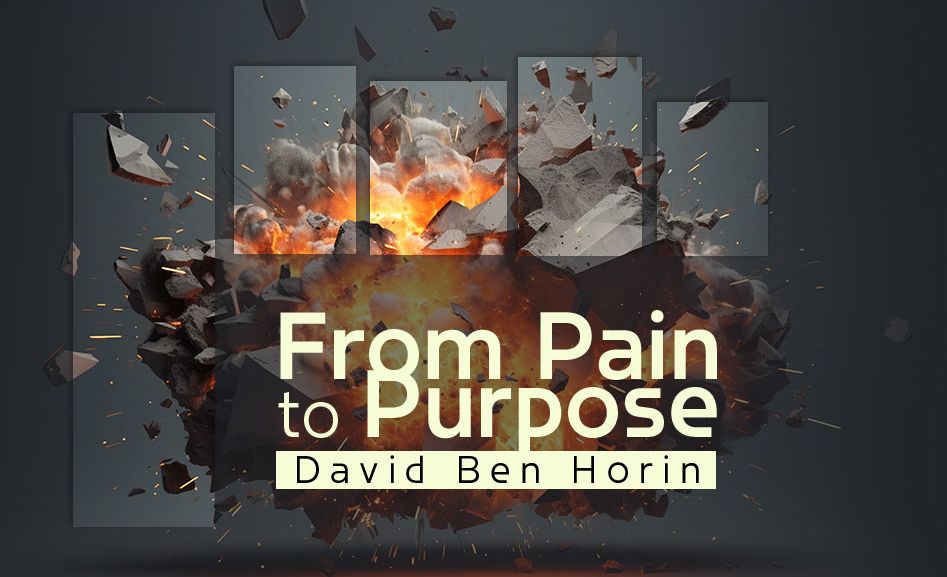

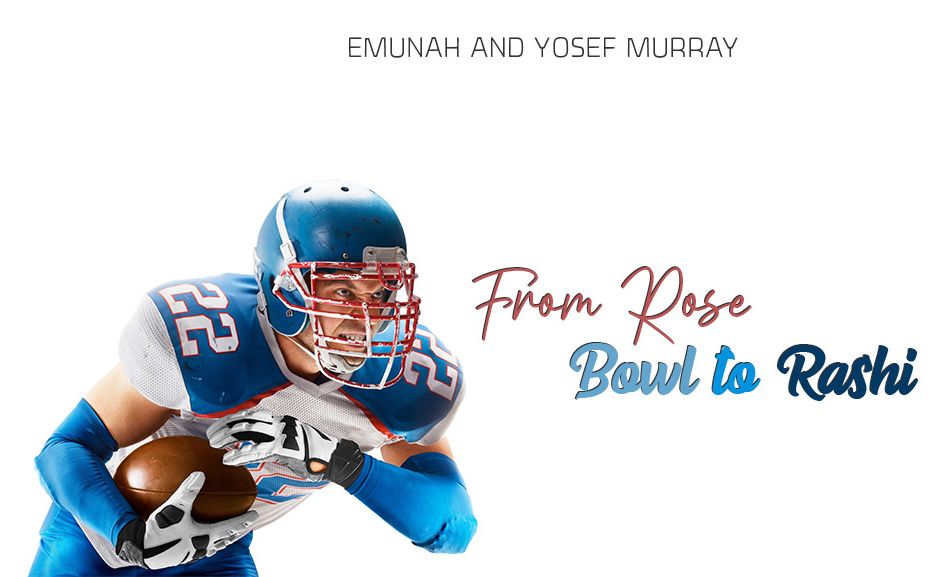
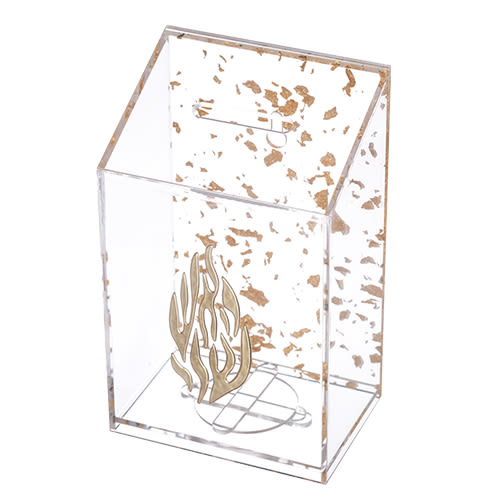
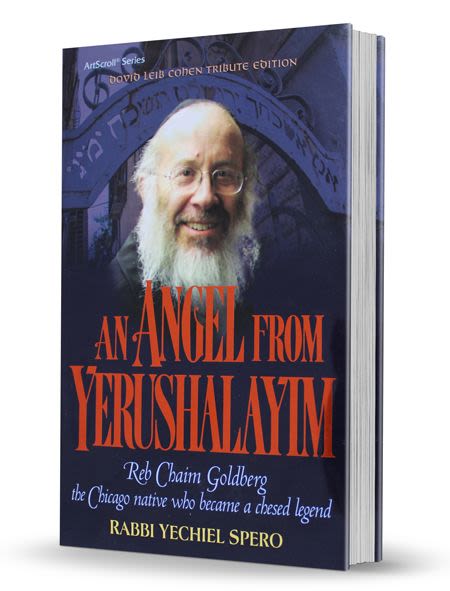




Tell us what you think!
Thank you for your comment!
It will be published after approval by the Editor.